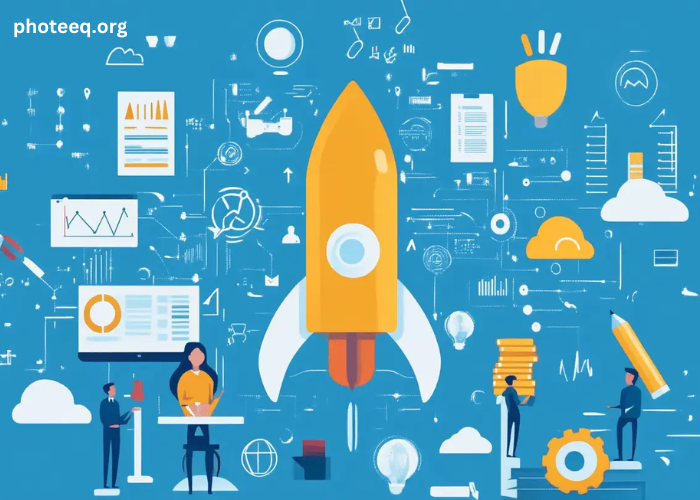
The startup landscape is constantly evolving, driven by advances in technology, societal shifts, and emerging market needs. As we move deeper into this year, a number of trends are shaping the world of innovative startups. These trends not only point to where opportunities lie but also highlight the creativity and ingenuity of entrepreneurs worldwide. Here are the key startup trends to watch this year:
1. AI and Automation Domination
Artificial intelligence (AI) continues to be a game-changer for startups. AI-driven tools are being applied across industries, from healthcare and education to manufacturing and finance. Automation, supported by AI, is helping startups optimize processes, reduce costs, and deliver better customer experiences.
In particular, generative AI is gaining significant traction. Startups are building innovative solutions that leverage large language models, like GPT, to generate content, automate workflows, and provide data-driven insights. Companies like OpenAI and Anthropic have set the stage, but smaller players are carving out niche applications.
2. Sustainable Tech Solutions
The climate crisis remains a critical global issue, and startups are stepping up to offer impactful solutions. Sustainability-focused businesses are developing innovative products in renewable energy, carbon capture, and circular economies. Green tech solutions that align with ESG (Environmental, Social, and Governance) goals are particularly attractive to investors looking for long-term returns.
This year, expect a rise in startups focused on reducing environmental footprints through clean energy innovations, eco-friendly packaging, and waste management technologies. AgriTech startups, using AI and IoT to improve food production while minimizing resource usage, are also gaining momentum.
3. HealthTech and BioTech Breakthroughs
The pandemic accelerated digital transformation in healthcare, and startups continue to capitalize on this trend. Telehealth platforms, wearable health devices, and personalized medicine are seeing increased adoption. Startups leveraging AI for drug discovery, genetic research, and remote patient monitoring are pushing boundaries in healthcare.
In addition, mental health solutions are a critical focus. Innovative platforms providing therapy access, mental health monitoring, and AI-driven emotional support are addressing the rising global mental health crisis.
4. Decentralized Finance (DeFi) and Web3
The blockchain revolution is not over. Startups are innovating in decentralized finance (DeFi) and Web3 technologies, exploring the next generation of financial systems. From blockchain-powered payment systems to NFTs, DAOs (Decentralized Autonomous Organizations), and decentralized identity solutions, there’s a strong emphasis on democratizing access to financial services and the internet.
While regulatory challenges persist, startups offering user-friendly and secure solutions are attracting interest. The focus has shifted toward real-world use cases of blockchain, such as supply chain transparency, micropayments, and tokenized real estate.
5. The Rise of EdTech 2.0
Education technology continues to evolve, driven by hybrid and online learning demands. Startups are using AI and immersive technologies like AR (Augmented Reality) and VR (Virtual Reality) to transform how we learn. Personalized learning experiences, adaptive assessments, and skill-based platforms are at the forefront of EdTech innovation.
This year, we’re seeing startups tackle global challenges like upskilling workers for digital economies, providing affordable education in underserved communities, and addressing gaps in STEM education for future generations.
6. Cybersecurity for an Evolving Threat Landscape
With the increased reliance on digital systems, cybersecurity has become more critical than ever. Startups are working on innovative solutions to combat ransomware, phishing, and other cyber threats. Technologies like AI-powered threat detection, blockchain-based security systems, and quantum encryption are helping companies safeguard their data.
As cybercrime grows more sophisticated, startups offering solutions for small businesses and individuals will likely see major growth.
7. Remote Work Innovation
The remote work revolution continues to inspire startup innovation. Startups are focusing on productivity tools, virtual office spaces, and employee well-being platforms. Technologies that foster seamless collaboration, automate team workflows, and ensure work-life balance are in high demand.
Additionally, startups are experimenting with VR-powered meeting rooms and AI assistants to make remote work more interactive and efficient.
8. SpaceTech Startups: The New Frontier
Space technology startups are emerging as a significant force in innovation. Companies focusing on satellite deployment, space tourism, and Earth observation technologies are making breakthroughs. As access to space becomes more affordable, startups are exploring applications in agriculture, communication, and climate monitoring.
This year, expect to see more partnerships between SpaceTech startups and governments or large corporations, driving growth in this sector.
9. Personalized Consumer Experiences
From e-commerce to entertainment, startups are delivering highly personalized experiences to consumers. AI and big data analytics enable businesses to understand user preferences, creating targeted products and services. Subscription models, smart recommendations, and virtual try-on technologies are improving customer satisfaction and loyalty.
Startups in this space are also leveraging immersive technologies, offering AR/VR shopping experiences and next-level personalization in digital entertainment.
10. Robotics and the Future of Work
Startups are innovating with robotics to address labor shortages and enhance productivity in industries such as logistics, manufacturing, and healthcare. From delivery robots to robotic process automation (RPA), these solutions are improving efficiency and reducing costs.
As robotics become more accessible, expect to see more applications in small- and medium-sized enterprises (SMEs).
Final Thoughts
Innovative startups are reshaping industries, solving pressing problems, and opening new opportunities in technology, sustainability, and human well-being. This year’s trends reflect a growing emphasis on practical, scalable, and impactful solutions. Entrepreneurs who stay ahead of these trends will be well-positioned to drive change and capture market demand in an ever-evolving business landscape.
For investors, consumers, and industry leaders, keeping an eye on these innovative startups is not just exciting but essential for understanding where the world is headed next.






